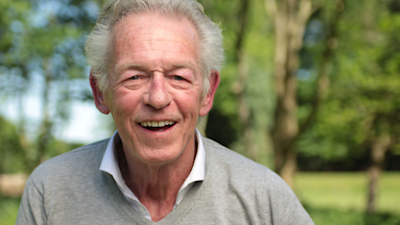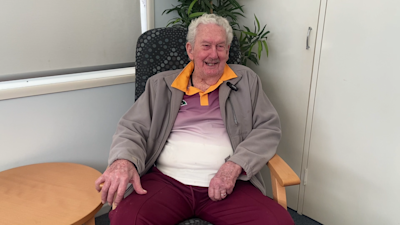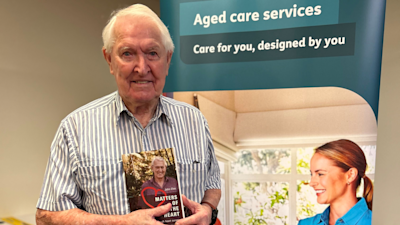Are you looking for a career that is deeply rewarding where there’s never a dull day?

Image: Photo of Vince and his dog on the right. On the left ' Vince, aged care program coordinator' are typed above the Life Without Barriers logo on an aqua background.
In the lead-up to Aged Care Employee Day, on 7 August, we sat down with Aged Care Program Coordinator Vince to ask him about the highs and lows of working in aged care.
How did you start working in aged care?
I started with Life Without Barriers about nine years ago as a support worker - actually, technically as a bus driver for our transport program back then. I was driving the people we support around, and Life Without Barriers asked if I could do some support services, and I said, yes. I was working as a casual, so I was happy to go full-time.
Originally, I never thought of doing this work. I had just finished uni doing graphic design and IT and had trouble finding work. At the time, my mum worked for Life Without Barriers, and she said, 'Vince, they need a bus driver. Why don't you apply for the job, and while you are there, you can look for other work?' So I started working for Life Without Barriers, and I've been here ever since.
I was a support worker for almost six years, then I went into doing rosters temporarily. There was a support coordination role available, and Mansoor the manager Mansoor said to me, 'Vince, why don’t you apply for the job? You know the clients’ service, and we think you can use it in the role.'
I got in, and now I'm a program coordinator. I learnt a lot from him, our other leaders, and now my current manager, Nikki.
What did you do as a support worker?
I did everything from assisting people with showering to cleaning their houses. I was working with a lot of older gentlemen. A lot of them preferred to have a male support worker, and there were not too many men working in the industry. In fact, for the first couple of years, I was the only male aged care support person here. Now we have a small group of gentlemen working with us.
A lot of the older men were very resistant to care, and some were in pretty dire straits. There weren't Home Care Packages like there are now. There was no one who referred these guys to a GP or to get physio, or get a nursing assessment.
I provided these services to the guys, and I think because of this, they became a little less resistant to the care. I picked some of them up and took them to the shops. With one gentleman, that was a big thing because he wanted to do it himself, but it was really dangerous for him to do so. He had this little mobility scooter, and it was not safe. He eventually got used to me coming once a week, and we built up a really good rapport.
I had the opportunity to teach a gentleman who was not very tech-savvy. He had end stages cancer, and he wanted to save his photos and his memories and his memoirs and send photos and communicate with his family back in Spain- and I was able to help him with that.

Image: A caregiver showing an older gentleman how to use an iPad.
It was really, really interesting to hear about the things that he did. He worked in theatre, and he had all these wild stories. And I was able to help him – like teaching him how to scan stuff and how to take old photos and get them online and share them with his family overseas and teaching him how to use Netflix. It opened him up to a whole bunch of TV shows.
For a guy who was at the very end stage of cancer, he was very full of life. He used to walk everywhere, and it was amazing what he used to get done, even with his illness. It was inspiring.
He was part of the LGBTQIA+ community, and I learnt a lot about that community from him. It was before the Yes vote (for gay marriage). He had a partner, and they lived together.
One day, I walked into his home, and he turned around and said,
'They said yes.'
I don’t think he and his partner actually got married because they already felt that way. He said, 'I don't need a piece of paper for that, you know. But it's good, you know?'
He loved it. He didn't think he was going to see it. A couple of months later, he passed away. He got to see a big moment in history, and he made it to a big birthday.
What do you do when someone you've supported passes away?
It is a harsh reality in aged care. People say, 'Oh, it’s part of the job, but it’s part of the job that sucks, you know.
One of the people I supported knew my mum when she used to work here and would always ask, 'How’s your mum doing?' The person recently passed away, and I thought, 'Could we have done more to help her?'
But I realised it was her time and she passed away from old age. I told myself, 'You did your job. She was looked after to the best of our abilities. She felt safe. She felt when she needed help, she could come to us, and if it wasn't for us, she might not have had that many extra years.'
We purchased fall alarms, made sure she got to her doctors’ appointments, made sure that we were up to date on all of her medical documentation to see if there were any referrals to further improve her quality of life, and we don't miss any extenuating medical issues. Without the aged care services, she might not have even been here for that as long as she was.
And yes, it sucks they pass away, and it's always sad.
I really believe that in this industry, making sure someone feels safe and cared for mitigates the sadness when they're no longer with us.
I always try my best to make sure that we cover all bases with our people’s safety and health. When they pass away, we know that they lived as long as they could, as safely as they could, with the best possible quality of life that we could have provided.
What are the key things you aim for when providing support?
The first thing I do is to identify what they are able to do for themselves and what they are unable to do for themselves anymore.
The more a person can do for themselves, the better, and it isn't because we don't want to do the service. The generation who are our clients are used to working multiple jobs, and now, all of a sudden, they can’t do anything for themselves. When someone loses all of their independence, especially someone of that super hard-working generation, it would be the most horrible feeling in the world.
So, we find out what they can do for themselves and what they're struggling with, and then slowly implement help. You're struggling with showering? It’s not 'We’re going to shower you.' No, no. We think, 'what equipment can we introduce?'
It's all about identifying how we can best accommodate peoples needs without taking away what they can do for themselves.
That's my main goal.
Recently, we helped an older person stay in their home as long as possible as they didn't want to go to a nursing home. We did as much as we could and implemented what she needed to keep her independent. When it came time to start the discussion that maybe a nursing home is needed, because she knew we did the best we could to help her keep her independence, she willingly went into a nursing home.
She had the attitude of, 'You’ve looked after me really well up to this stage. But now I need way more care. You know, I think I'm ready for a nursing home.' It was the most streamlined transition into a nursing home I had ever seen.

Image: A senior gentleman sitting in a van smiling.
What makes a good Aged Care worker?
Empathy and you must have perspective of people's situations. If you don't have those two things, you're going to hate your job. You will fail.
What would you say to someone who's thinking about a career in Aged Care? What would you advise them?
Go for it. You'll have a very interesting job. You never have a dull day. Ever. Work is really, really rewarding. You'll learn so much about people in general. You will have a million stories.
I like the stories - the lives that some of our people have lived are just amazing.
It will keep you on your toes. You'll be challenged every day. It will be rewarding as well.
And you will care for the people you support. Yes, you will have professional boundaries, and it is a professional relationship. But you've looked after this person for six years. You've known them. You've learnt about their family and their likes and dislikes and their history and the things that they've done with their life. You will care for them.
You planned to work in graphic design and IT. What do you feel about where life took you?
When I was younger, I didn't think to go into an industry where I would help people. It wasn't my plan. I loved art. I love computers. Graphic design seems like the right thing. Turned out to be a really good hobby.
I found a job where I learned a lot about myself. I've always been really upset that, as a guy, being empathetic and nice to other men - especially back in the day - just wasn't done.
I think I'm meant to work in a place where I help people.
I like being nice to people. I like being empathetic to people. I enjoy it. In a world that doesn't usually value these qualities, I have a job where they are paramount.
When the Aged Care Commission spoke to Vince during a routine review, he made such a positive impression that they commended him to his manager, Nikki.
“The Commission was impressed with how well he knew the people he supported and how it was evident that he had visited the people he supports regularly to assess them when their care needs changed.
"From my own experience, I know Vince is someone who cares a lot about his work and the people he supports. It’s not a ‘tick box’ thing to him,” said Nikki.


